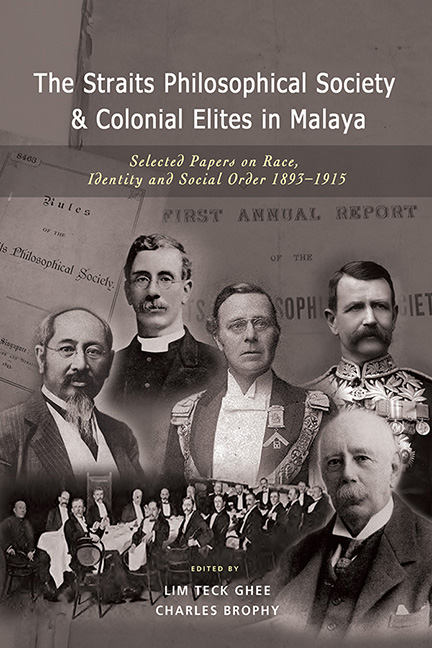 The Straits Philosophical Society and Colonial Elites in Malaya
The Straits Philosophical Society and Colonial Elites in Malaya 21 - Socialism Amongst the Chinese
Published online by Cambridge University Press: 09 January 2024
Summary
Editors’ Note
Whilst in his earlier essay on the Chinese revolutionary movement in Malaya, Lim Boon Keng suggested that he did not have the space to discuss the rise of socialism in China, his subsequent presentation to the Society a few months later in 1913 dealt with this topic. Initially tracing the Confucian origins of what he identified as socialist thought in China, he sought to distinguish this socialism from the modern socialism of Europe. Whilst Sun Yat-sen’s socialism mirrored, for Lim, the socialism of Marx and Engels, Sun remained for him also a Confucianist. Lim also sought to contrast Chinese socialism with the “Jacobins’’ of the European nationalist movement and the Westernized radical ideas of socialism being produced in China by “rabid communists, syndicalists, and socialists, and few even graduating as nihilists and anarchists”. This had culminated in the bomb-throwing in Peking in 1905, and attempts to uproot traditional Confucian culture. For Lim, Confucianists who “have striven to resuscitate the old Socialism based on ethics and the natural humanistic order” offered an alternative and more ethical model of modernity than the European socialism practised in Europe.
In any study of Socialism among the Chinese, the vast importance of the past economic history of the nation could not be overlooked. For thousands of years the Government of China has relied upon the economic principles of Confucianism and Chinese society has retained up to this day the peculiarities which patriarchic communism had imparted to it in the prehistoric era. The immense gulf separating the social conditions of the East and of the West explains the wide divergence of the methods of Socialism. The prevalence of serfs and slaves in Europe down to the modern ages, and the oppressed state of the labourers, who had in most Western States, become detached from the soil, explain why in the West the Socialistic movement has been carried on from the lower social orders. In China some form of Socialism has, until our own day, been always attempted by the Government, while the free people of China has been contented with their domestic and village liberties and immunities.
- Type
- Chapter
- Information
- The Straits Philosophical Society and Colonial Elites in MalayaSelected Papers on Race, Identity and Social Order 1893-1915, pp. 305 - 316Publisher: ISEAS–Yusof Ishak InstitutePrint publication year: 2023
